Affective Education is Essential for Excellence
(Hong Kong – 25 October 2016) The Research Division of the Hong Kong Academy for Gifted Education (HKAGE) commissioned the Chinese University of Hong Kong to conduct a telephone survey in March 2016 with secondary school members and alumni of the HKAGE who had participated in the courses offered by the HKAGE in 2015. Over 500 secondary school members and alumni were interviewed on their satisfaction and learning outcome of the HKAGE courses and services. The telephone survey was conducted using random sampling, to which 302 secondary school members and 199 alumni responded. The findings revealed that majority of the student members and alumni were satisfied with the courses and services of the HKAGE in general. Most of the interviewees considered that courses and services of the HKAGE could help broadening their horizons, improving their knowledge of a particular domain and deepening their interest in a particular domain.
In terms of academic performance, nearly 6% of the alumni obtained 5** in five subjects or above in the HKDSE, while over 30% of the alumni who were university graduates were placed on the Dean’s List or graduated with a First Class Honour. Such results were truly encouraging. Nevertheless, the survey also pointed out that student members and alumni were less satisfied with the help offered by the HKAGE in the areas of social skills (e.g. communication and social skills, widening the scope of social connection) and personal growth (e.g. helping to plan for the future, enhancing leadership skills). Some of the student members and alumni even considered that they had no achievements to be proud of in recent years. Therefore, the HKAGE finds it necessary to further develop Affective Education programmes.
Professor Ng Tai Kai, Executive Director of the HKAGE, stated, “The HKAGE has been aware of the importance of Affective Education in the development of gifted students. From 2015 onwards, the HKAGE initiated to provide courses on Affective Education for the student members, and the “1+1” Group is one of the best examples. Target of this group is primary student members and their parents. This group serves around 40 students and their parents every year, which marks a total of 80 persons. We believe that Affective Education better starts at young age to enable a balanced development in gifted students, and to unleash their individual potential effectively in the long run. Besides, we hope to offer more Affective Education courses so that more students could benefit from them.”
Ms Tiffany Sin, Senior Guidance Counsellor of the HKAGE, supplemented that the “1+1” Group could hopefully enhance the creative problem solving skills of the gifted students, and provide them with an interactive environment for developing mutual trustful and encouraging relationships with their gifted peers. It would help to enhance their social, problem solving and communication skills, and respond to their needs for learning and affective development. Parents are allowed to observe the learning patterns of their children and their way of interactions with their peers in class, by which their practical skills of nurturing their children could be enhanced as well.
Tsui Tsz Ching, a P6 student who has participated in the “1+1” Group, designed a vehicle named “Bubble Car” after having considered that her grandmother was unable to drive due to eye diseases, and in response to the global energy shortage. The “Bubble Car” is fueled by solar and feces energy (biogas), and driven by brain waves. Tsz Ching said, “I have learned a lot of new things in this programme, made a lot of new friends, and I have learned the creative problem solving skills from CPS model. I am very happy that I was able to know about the inner feelings of my mother through this programme. She does not talk much in our daily lives, but she actually is a very happy person.”
In conclusion, the HKAGE hopes to provide courses on Affective Education with diversities for gifted students in the future, allowing a better nurturing ground for their social and emotional development, as well as striking a balance between their academic development and personal growth.
Appendix I
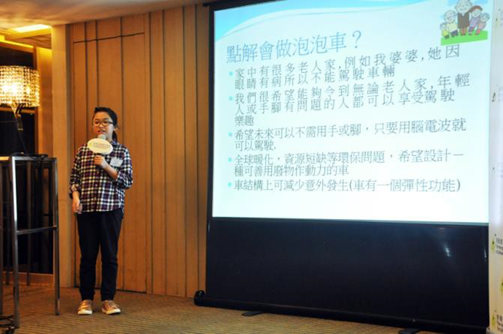 | 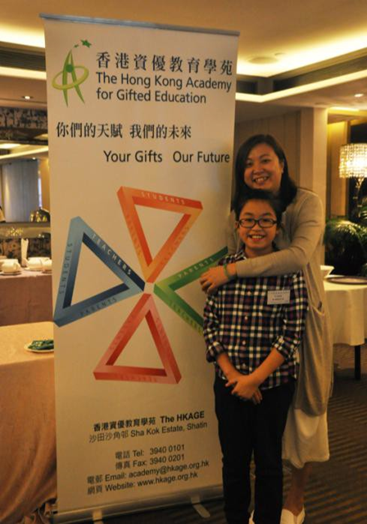 |
| Tsui Tsz Ching, a P6 student, designed a solar and feces energy (biogas) fueled and brain waves driven vehicle named “Bubble Car”, after having considered that her grandmother was unable to drive due to eye diseases, and in response to the global energy shortage. | Tsz Ching has learned about the inner feelings of her mother through participating in the “1+1” Group, facilitating their parent-child communication. |
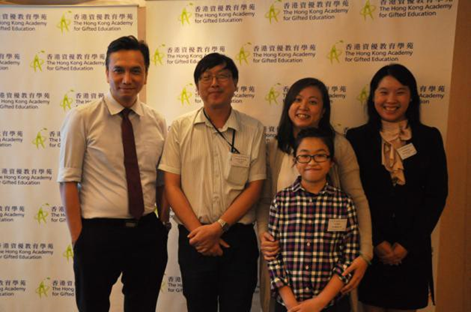 | 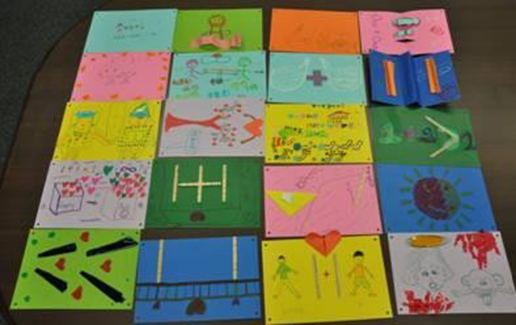 |
| Photograph of Mr Eric Fung (Research Manager of the HKAGE), Prof Ng Tai Kai (Executive Director of the HKAGE), Tsz Ching and her mother (participants of the “1+1” Group), and Ms Tiffany Sin (Senior Guidance Counsellor of the HKAGE). | Projects of the student participants of the “1+1” Group are splendid and magnificent. |
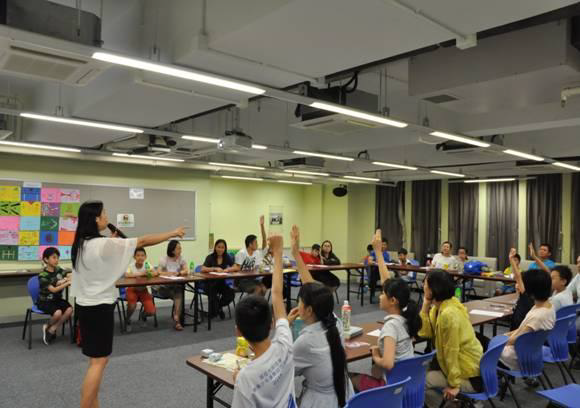 | |
| Student members learned the creative problem solving skills through participating in the “1+1” Group. | |






